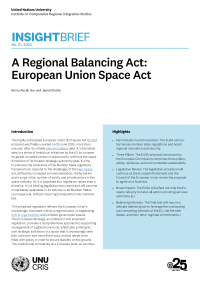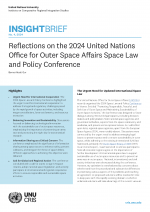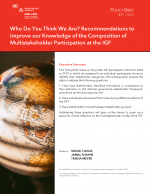A Regional Balancing Act: European Union Space Act

The European Union Space Act (EUSA) is the most recent EU regulatory initiative to protect EU interests in the face of challenges in the new space era, characterised by increased congestion, contestation, competition and increased involvement of the private sector. The EUSA proposal introduced by the European Commission comprises measures for safety, resilience, and environmental sustainability. It It harmonises member state regulations for the establishment and functioning of the internal market in space services and space-based data to boost regional innovation and security. It aims to strengthen the EU’s global competitiveness and strategic autonomy, setting a regional model for space industry governance. This policy brief explores the potential impact of the EUSA, once adopted, in the context of the overlapping regional commitments of the EU Member States.)
Highlights:
Harmonisation and Innovation: The EUSA aims to harmonise member state regulations and boost regional innovation and security.
Three Pillars: The EUSA proposal introduced by the European Commission comprises three pillars: safety, resilience, and environmental sustainability.
Legislative Review: The legislative procedure will continue as the European Parliament and the Council of the European Union review the proposal to agree on a final text.
Broad Impact: The EUSA will affect not only the EU space industry but also all actors providing services within the EU.
Balancing Interests: The final text will require a delicate balancing act to leverage the overlapping and competing interests of the EU, the Member States, and their other regional commitments.)


